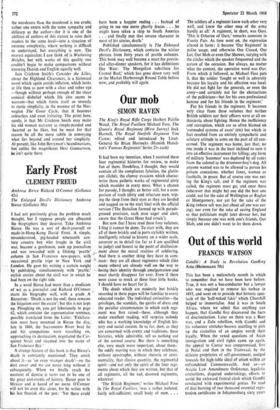Our mob
SIMON RAVEN
The King's Royal Rifle Corps Herbert Fairlie Wood, The Royal Fusiliers Michael Foss, The Queen's Royal Regiment (West Surrey) Jock Haswell, The Royal Norfolk Regiment Tim Carew; edited and introduced by Lieut- General Sir Brian Horrocks (Hamish Hamil- ton's 'Famous Regiments' Series 21s each) It had been my intention, when I received these four regimental histories for review, to make fun of them. Doubtless, I thought, they would contain all the complacent fatuities, the glutin- ous clichés, the clumsy evasions which charac- terise those pathetic works of regimental piety which moulder in every mess. What a chance for parody, I thought; or better still, for a com- parison of truth (dirty and reluctant men, wip- ing the sleep from their eyes as they are herded and nagged on to the start line) with the official version ('The Battalion formed up with parade- The deeds which are modestly but briskly recorded in these 'Cages will be.familiar to every educated reader. The individual curiosities—the -who has a working knowledge of English his- tory and social custom. In so far, then, as they are concerned with events and traditions, these histories, while admirable, tell us nothing out of the normal course. But there is something else, very muck more important, about them: the oddly moving way in which they celebrate, without apostrophe, without rhetoric or senti- mentality, that elusive quantity, the regimental spirit—and not only the spirit of the four regi- ments about which they are written, but that of all regiments, all the sad, doomed regiments, whatever.
'The British Regiment,' writes Michael Foss in The Royal Fusiliers, `was a rather isolated, fairly self-sufficient, small body of men. . . . The soldiers of a regiment knew each other very well,, and knew the other men of the army hardly at all.' A regiment, in short, was Ours. 'This is Osborne of Ours,' remarks someone in Vanity Fair. As time went on, the expression altered in form: it became `Our Regiment' in polite usage, and otherwise Our Crowd, Our Lot, Our Mob or even Our Shower, varying with the circles which the speaker frequented and the nature of the occasion. But always, no matter what the context, the operative word was Our. From which it followed, as Michael Foss puts it, that the soldier 'fought so well in adversity because his loyalty and his affection was local. He did not fight for the generals, or even the army—and certainly not for the abstractions of the politicians—but for his own professional honour and for his friends in the regiment' For his friends in the regiment. It becomes vely clear from these volumes that neither British soldiers nor their officers were at all en- thusiastic about fighting. Hence the inefficiency and corruption, which are so often blamed on 'outmoded systems of caste' (etc) but which in fact resulted from an entirely sympathetic and salutary attitude to arms on the part of all con- cerned. The regiment was home, just that; no one inside it was in the least inclined to turn it into an effective instrument for killing; any form of military `keenness' was deplored by all ranks from the colonel to the drummer-hors dog. All anyone wanted was to be allowed to pursue his private avocations, whether foxes, women or footballs, in peace. But of course one was eat- ing the King's salt, and if the regiment was called, the regiment must go; and once there (wherever that might be) one did the best one could, not for the sake of Wellington or Raglan or Montgomery, nor yet for the sake of the King (whose salt was just about all one was eat- ing), nor even for the sake of saving England so that politicians might later devour her, but simply because one was with one's friends, Our Mob, and one didn't want to let them down.






































 Previous page
Previous page